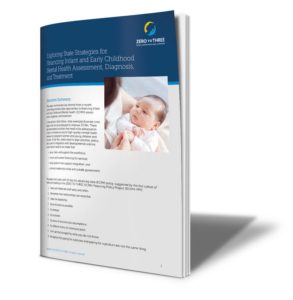This article summarizes key themes from Nevada’s role in a convening of states and jurisdictions centered around improving state policies supporting Infant and Early Childhood Mental Health assessment, diagnosis, and treatment.

Children’s earliest experiences impact their brain formation and in turn, their social and emotional, physical, cognitive, communication, and sensory and motor skills development. Recognizing the tremendous opportunities and risks associated with this critical time, states are increasingly investing in promoting infant and early childhood mental health (IECMH), defined as the capacity of a child from birth to age five to experience, express and regulate emotions; form close, secure interpersonal relationships; and explore his/her environment and learn, all within the context of family and cultural expectations. ZERO TO THREE released two papers in 2018 and 2019 highlighting strategies states are employing to support children’s IECMH. Highlights from Nevada include:
- In a section focused on state’s using DC:0-5™ (a diagnostic classification of mental health and developmental disorders of infancy and early childhood published by ZERO TO THREE) for developmentally appropriate eligibility determination and billing, Nevada’s work is highlighted. Nevada’s Division of Child and Family Services and some private clinicians created a crosswalk between DC:0-5 and ICD-10 for eligibility and billing purposes.
- In a section focused on states formally recognizing DC:0-5 in public and commercial insurance programs, including Medicaid, through legislation, contract language, or regulatory changes, Nevada is highlighted. The Nevada Department of Health and Human Services adopted the DC:0-3R more than a decade ago and added it to the state’s Medicaid manual. By doing so, it allowed DC:0-3R diagnoses to be recorded in the electronic health record and services billed for children up to 48 months old. The inclusion of DC:0-3R (and subsequent revisions) was advocated by early childhood mental health clinicians who had been trained on the original DC:0-3 in the 1990s. These clinicians took part in the Behavioral Health Redesign process, and they successfully presented the challenges of using the DSM to assess and diagnose disorders in young children. Subsequent to the policy change, all mental health clinicians employed by the Nevada Division of Child and Family Services (DCFS) have been trained on DC:0-3R, as have some community partners. Although specific language about DC:0–5 was removed from the Medicaid State Manual in a recent revision, DCFS and some private clinicians continue to use the DC:0–5 and to crosswalk the DC:0–5 disorders to the 10th edition of the International Classification of Diseases and Related Health Problems (ICD-10) for eligibility and billing purposes.
Learn more about how Nevada and other states are promoting IECMH in Advancing Infant and Early Childhood Mental Health: The Integration of DC:0–5™ Into State Policy and Systems and Exploring State Strategies for Financing Infant and Early Childhood Mental Health Assessment, Diagnosis, and Treatment.
Nevada is one of twenty states and jurisdictions participating in ZERO TO THREE’s IECMH Financing Policy Project that supports states in improving IECMH policy and practice, with a focus on financing.


